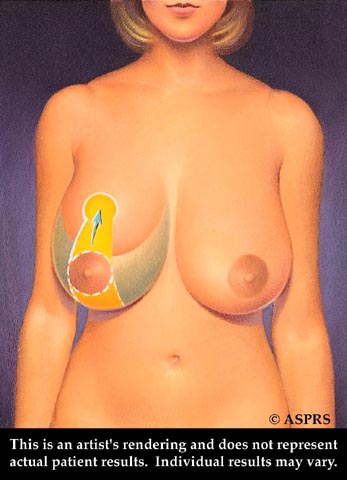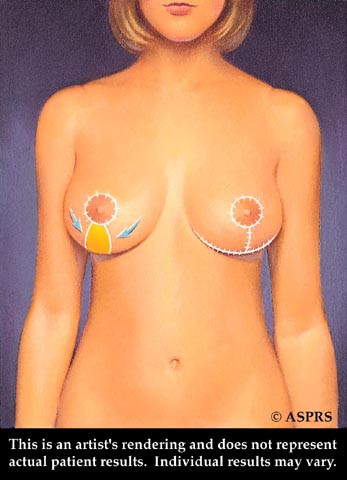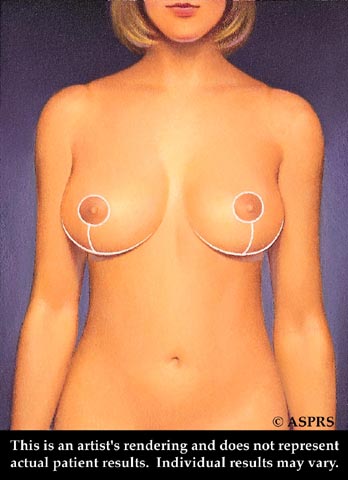Breast Reduction in Huntsville, AL
Breast reduction, also called “reduction mammaplasty,” is a surgical procedure designed to reduce breast size in women, relieving them of pain and other issues associated with large breasts. If you have large, heavy breasts, a breast reduction can help alleviate chronic pain in your neck and back, increase your ability to engage more easily in routine activities or exercise, and make finding clothing less frustrating.
What Is Breast Reduction?
Breast reduction is a surgical procedure designed to remove excess breast tissue, fat, and skin to achieve a smaller, more proportionate breast size. Breast reduction surgery is typically undergone by women who experience physical discomfort such as chronic neck or back pain, skin irritation, or reduced ability to participate in certain activities or perform daily tasks due to having overly large breasts. Breast reduction can also boost your confidence in your body, as having too-large breasts can make you feel self-conscious and make it challenging to find clothing that fits appropriately.
What Are the Benefits of Breast Reduction?
Your Clothing Fits Better
If you have a larger bust, you may find it difficult to find fashionable clothing that fits as well as you’d like. Shopping for lingerie and swimsuits with adequate coverage and support can be challenging, as can finding a top that looks tailored but still fits properly over your breasts. A breast reduction creates a more balanced shape that can boost your confidence both in and out of the fitting room.
Your Back Pain Is Reduced
If you have heavy breasts, back pain and indentations in your shoulders from bra straps are likely a part of your everyday life. A breast reduction can reduce the weight of overly large breasts, eliminating the associated discomfort.
Your Physical Ability Is Improved
Large, heavy breasts can often affect your athletic performance and other physical activities. A breast reduction can increase your range of motion and make it easier to participate in activities you enjoy.
Skin Irritation Is Eliminated
If you have large breasts, you may experience skin irritation like chafing, rashes, or other chronic skin conditions. Breast reduction not only makes your breasts smaller but lifts them, making hygiene easier and lessening skin irritation.
Am I a Good Candidate For Breast Reduction?
Candidates for breast reduction are in good overall physical health and do not smoke. Ideal candidates for breast reduction want to reduce the size of their breasts either for aesthetic reasons or to relieve pain and discomfort.
How to Prepare for Breast Reduction Surgery
Preparing in advance for your breast reduction is key to ensuring a smooth surgery and recovery. Here are some tips to help you get ready for breast reduction surgery:
Undergo Medical Testing
You may need to undergo a medical workup before your breast reduction, including blood tests and possibly a mammogram, to ensure you are a good candidate for surgery. If you have any underlying medical conditions, you may also need to get clearance from your doctor.
Adjust Certain Medications
Because certain medications (like aspirin, ibuprofen, some herbal supplements, and prescription blood thinners) can increase the risk of bleeding or interfere with anesthesia, you may need to stop taking them at least two weeks before your breast reduction. However, make sure you consult your doctor before stopping the use of prescription medications.
Stop Nicotine Use
Nicotine, whether in cigarettes, vapes, or patches, restricts blood flow and can significantly impact healing after breast reduction surgery. Most surgeons recommend stopping smoking at least four weeks before and after your procedure.
Prepare for Recovery
Breast reduction surgery requires a couple of weeks of downtime, so planning ahead can make your recovery easier. Set up a comfortable recovery area at home, complete with electronics (and chargers), television remotes, books, and snacks. You will also want to have water and medications within easy reach, as well as the supplies necessary for caring for your incisions.
You’ll need someone to drive you home after surgery and stay with you for at least the first 24 hours. It is also helpful to prepare meals ahead of time and order groceries so that you can keep your activity to a minimum as you begin the healing process.
How Is Breast Reduction Surgery Performed?

Heavy breasts can lead to physical discomfort, a variety of medical problems, shoulder indentations due to tight bra straps, and extreme self-consciousness.

Incisions outline the area of skin, breast tissue, and fat to be removed and the new position for the nipple.

Skin formerly located above the nipple is brought down and together to reshape the breast. Sutures close the incisions, giving the breast its new contour.

Scars around the areola, below it, and in the crease under the breast are permanent, but can be easily concealed by clothing. With smaller better proportioned breasts, you’ll feel more comfortable and your clothes will fit better.
What Can I Expect From My Breast Reduction Recovery?
After your breast reduction, you will need to take one to two weeks off work to recover. You will need to refrain from your normal activities and allow your body to rest to encourage healing. After the first two weeks, you will be able to get back to your daily routine, as well as gradually return to light exercise. After six weeks, you can resume more strenuous activities and exercise with no restrictions as long as your surgeon clears you.
When Will I See My Breast Reduction Results?
You will be able to see and feel the results of your breast reduction immediately after your surgery. However, swelling will mask your full results. Swelling typically dissipates significantly in the first couple of weeks after surgery, but some swelling will persist for a couple of months after your breast reduction.
Will I Have Scars After My Breast Reduction?
As with any surgery, you will have some scars after your breast reduction. Typically, there will be a scar hidden in the color of the areola, a vertical scar from the areola down to the breast crease, and a scar extending along the breast crease. Any scars will fade over time, and protecting your scars from the sun is essential to prevent them from darkening.
How Long Will My Breast Reduction Results Last?
The results of your breast reduction surgery are designed to be long-lasting, giving you a more balanced body contour and eliminating the weight of your formerly heavy breasts.
However, weight gain, pregnancy, and breastfeeding can all cause your breasts to become larger, so it is important to stay at a stable, healthy weight to ensure that your breast reduction results last as long as possible.
Breast Reduction FAQ
Is breast reduction painful?
After your breast reduction, you will experience some discomfort as you heal, but it is minimal and can be easily managed with prescription or over-the-counter pain medication. You will wear a compression bra during your recovery to provide support and minimize pain and swelling.
Is breast reduction covered by insurance?
Breast reduction is one of the few plastic surgeries eligible for insurance in certain cases. Some health insurance providers cover the cost of a breast reduction if you suffer from pain or discomfort because of the size or weight of your breasts, or if you have chronic skin conditions that can be remedied by the surgery. Before undergoing breast reduction surgery, contact your insurance provider to determine what they require to provide coverage for your procedure.
What are the risks associated with breast reduction surgery?
As with any surgical procedure, there are potential complications associated with breast reduction. Risks may include:
- Bleeding
- Infection
- Poor wound healing
- Changes in skin sensation
- Asymmetry
Following your surgeon’s post-operative instructions is essential to ensuring that your recovery after breast reduction is safe and free of complications. Be sure to attend all scheduled follow-up visits with your surgeon and contact them if you experience any concerning side effects.
Will breast reduction affect my ability to breastfeed?
Depending on the extent of your breast reduction, your ability to breastfeed may be affected. Removing breast tissue (including milk ducts) may impact milk production, and there is a possibility that some milk ducts may be severed by your breast reduction incision. Pregnancy and breastfeeding can also result in weight gain in the breasts, which will affect the results of your breast reduction. It is generally recommended that you are done having children before undergoing breast reduction surgery.
Can breast reduction surgery correct sagging breasts?
Yes, breast reduction surgery can lift sagging breasts, especially when sagging is caused by heavy breasts. During a breast reduction, excess breast tissue, fat, and skin are removed, and your surgeon will reshape and lift your breasts, as well as reposition your nipples.
Have additional questions about the Breast Reduction in Huntsville, AL procedure? Schedule a Consultation with Dr. Knowling for further information.


